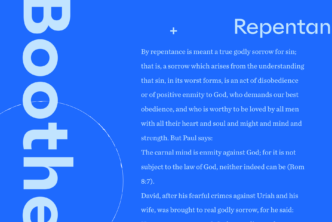The pastor had been preaching a series of messages through 1 Peter. When it was time for 1 Peter 3:14–22, he sincerely announced, “We’re going to skip this section since it’s just too strange.” He was right and wrong that day. As odd as it is, this passage is one of the most compelling in the New Testament—if you understand what it’s saying.
But even if you should suffer for righteousness’ sake, you will be blessed. Have no fear of them, nor be troubled, but in your hearts regard Christ the Lord as holy, always being prepared to make a defense to anyone who asks you for a reason for the hope that is in you; yet do it with gentleness and respect, having a good conscience, so that, when you are slandered, those who revile your good behavior in Christ may be put to shame. For it is better to suffer for doing good, if that should be God’s will, than for doing evil. For Christ also suffered once for sins, the righteous for the unrighteous, that he might bring us to God, being put to death in the flesh but made alive in the spirit, in which he went and proclaimed to the spirits in prison, because they formerly did not obey, when God’s patience waited in the days of Noah, while the ark was being prepared, in which a few, that is, eight persons, were brought safely through water. And now the antitype—that is, baptism—saves you, not be means of a removal of dirt from the body, but as an appeal to God for a good conscience on the basis of the resurrection of Jesus Christ, who has gone into heaven and is at the right hand of God, with angels, authorities, and powers having been subjected to him.
The theme of 1 Peter is that Christians must withstand persecution and persevere in their faith. To understand how our odd passage fits with that theme, we need to get our heads around the concept of “types” and typology—a kind of prophecy that occurs in the Bible.
We’re most familiar with prophecies directly from the mouth of a prophet. But a “type” is an unspoken prophecy; it is an event, person, or institution that foreshadows something that will come. For example, Paul tells us that Adam was a type of Christ. He foreshadowed or echoed something about Jesus, namely that His work on the cross would affect all people just as Adam’s disobedience had a global effect (Rom 5:14).
First Peter 3:14–22 uses typology. The passage presumes that events associated with Genesis 6 typify or foreshadow the gospel and the resurrection. The episode of Genesis 6:1–4, where angelic beings (the “sons of God”) cohabited with human women—the catalyst to the wickedness that brought the judgment of the flood—was especially significant. For Peter, these events were commemorated during baptism.
Peter was evidently familiar with Jewish tradition about Genesis 6. Jewish writers just prior to the New Testament era taught that God sent Enoch (Gen 5:21–24) to inform the fallen sons of God that they were doomed for what they had done. These angelic beings were, according to Jewish traditions, held in a prison under the earth.
Jesus as a Second Enoch
Peter saw a theological analogy in these ideas. Just as Jesus was the second Adam for Paul, Jesus is the second Enoch for Peter.
Enoch descended to the imprisoned fallen angels to announce their doom. First Peter 3:14–22 has Jesus descending to these “spirits in prison,” these fallen angels. He then tells them they were defeated, despite His crucifixion. God’s plan of salvation and ruling His kingdom was still intact. In fact, it was right on schedule. The crucifixion actually meant victory over every demonic force opposed to God. This victory declaration is why 1 Peter 3:14–22 ends with Jesus risen from the dead and set at the right hand of God—above all angels, authorities, and powers.
How does this relate to baptism? It explains the logic of the passage. Two words in verse 21 need reconsideration in light of this backdrop. The word most often translated “appeal” (ἐπερώτημα, eperōtēma) in verse 21 is best understood as “pledge” here. Likewise, the word “conscience” (συνείδησις, suneidēsis) does not refer to the inner voice of right and wrong here. Rather, the word refers to an attitude or decision that reflects one’s loyalty.
Baptism, then, is not what produces salvation; it is an oath of loyalty to the risen savior—a public avowal of who is on the Lord’s side in the cosmic war between good and evil. It is also a visceral reminder to the defeated fallen angels. Every baptism is a reiteration of their doom in the wake of the gospel and the kingdom of God.
Early Christians understood the typology of this passage and its link back to the fallen angels of Genesis 6. Early baptismal formulas included a renunciation of Satan and his angels for this very reason. Baptism was and is spiritual warfare.
***

This article is excerpted from Dr. Heiser’s book I Dare You Not to Bore Me with the Bible.
Discover more fascinating aspects of the Bible with Dr. Heiser
Keep exploring the strange, perplexing, and mysterious aspects of the Bible with these excerpts from Dr. Michael S. Heiser’s The Unseen Realm: Recovering the Supernatural Worldview of the Bible. Or dive deeper into the supernatural world of the Bible and pick up a copy of The Unseen Realm today.





